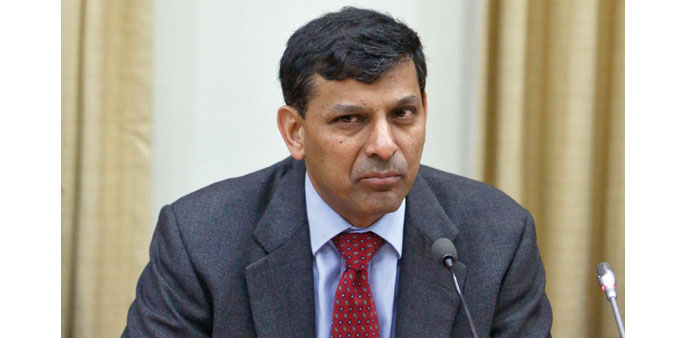Bloomberg
New Delhi
Don’t hold your breath for another interest-rate cut by Reserve Bank of India (RBI) Governor Raghuram Rajan: inflation is accelerating and Goldman Sachs Group is among banks predicting a prolonged pause from the monetary authority.
Consumer prices probably rose 5.4% last month from a year earlier, according to the median of 19 estimates in a Bloomberg News survey ahead of December 14 release. That would be a 5-month high and the fastest in major Asian economies. Goldman Sachs, Australia & New Zealand Banking Group and Mizuho Bank expect Rajan to keep the repurchase rate at 6.75% throughout 2016.
“If you look at the forecasts, then inflation pretty much remains above the RBI’s target range of 5% for January to March 2017, which suggests to us that the RBI is likely to remain on hold,” Tushar Poddar, an economist at Goldman Sachs, said at a briefing in Mumbai.
The central bank lowered borrowing costs 50 basis points in September, the biggest reduction in more than six years, and argues the current monetary stance can achieve the 5% consumer-price inflation target for March 2017.
While the slump in crude oil has eased some Indian price pressures,mns of federal workers are set for pay increases that occur once in about a decade and officials are grappling with rising food costs after two successive poor monsoons.
India’s world-beating pace of economic growth - 7.4% last quarter from a year earlier - supports the case for Rajan to pause. Emerging nations are also bracing for swings in stocks, bonds and currencies from a looming US Federal Reserve rate increase.
India’s 10-year government bond yield climbed to 7.79% from a recent low of 7.51% in October.
The rupee has weakened 1.7% against the dollar so far this quarter, one of Asia’s worst performances, while the S&P BSE Sensex is down 3.5% in the same period.
Ten-year government bond yield has climbed to 7.78% from a recent low of 7.51% in October. The rupee has weakened 1.7% against the dollar so far this quarter, one of Asia’s worst performances, while the S&P BSE Sensex is down 3.5% in the same period.
If recommendations to boost the pay of federal employees are accepted, the government will need to spend about $15bn in the year starting April 1, a step that could spur domestic demand and prices. Risks from rising food costs led Prime Minister Narendra Modi’s cabinet to clear a proposal to import more lentils, a staple in India.
Putting all the pieces together, ANZ predicts no change in borrowing costs across the whole of next year.
“They are in no hurry to cut interest rates,” said Devika Mehndiratta, an economist at the bank in Singapore.

Rajan: Cautious approach.
